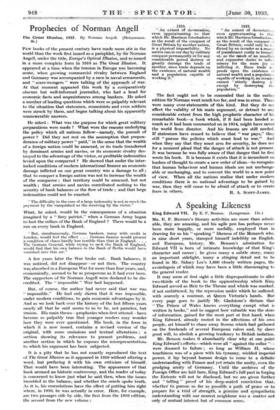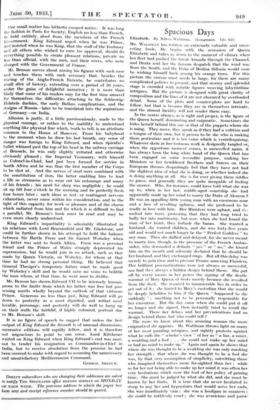MR. E. F. BENSON'S literary activities are more than admir-
able, they are amazing, and his agile pen has perhaps never been more happily, or more usefully, employed than in drawing for us his " speaking " likeness of the Monarch who, in nine short years, stamped himself indelibly on English. and European, history. Mr. Benson's admiration for
Edward VII is born of intiniate knowledge of that King's character and career he gives many a subtle story, many an Important sidelight, many a stinging detail not to be found in Mr. Sidney Lee's 1,600 closely written pages, the avoirdupois of which may have been a little discouraging to the general reader.
It may seem at first sight a little disproportionate to allot two-thirds of the book to the apprenticeship which King Edward served as Heir to the Throne and -which was marked, if not embittered, by the repression under which he suffered, with scarcely a murmur, at Queen Victoria's hands. But every page goes to justify Mr. Gladstone's dictum that "The Prince of Wales knows everything except what is
written in books," and to suggest how valuable was the store of information, gained for the most part at first hand, when King Edward, already rooted in the affections of his own people, set himself to chase away frowns which had gathered on the foreheads of several European rulers and, by sheer good will, to abolish a growing tendency to British isolation. Mr. Benson makes it abundantly clear why at one point King Edward's efforts—which were all " against the collar "- were doomed to failure ; so long as William II, whose touchiness was of a piece with his tyranny, wielded imperial power, it lay beyond human design to come to a definite understanding with France and yet retain the amity, even the grudging amity of Germany. Until the archives of the
Foreign Office are laid bare, King Edward's full part in forging the Entente will not be disclosed, but we are given further and " telling " proof of his deep-seated conviction that, whether to' pursue as far as possible a path Of peace or to prepare for a trial of strength, a kenuine and sympathetic
understanding with our nearest neighbour was a matter not only of mutual interest but of common sense.
One small matter has hitherto escaped notice. It was long the fashion in Paris for Society, English- no less than French, to hold entirely. aloof from the members of the French Government. King Edward urged when he was Prince, and insisted when he was King, that the staff of the Embassy sod all others who wished to earn his approval, should do everything. Possible to create pleasant relations, private no less than official, with the men, and their wives, who were charged: with the Government of France.
Mr. Benson moves about among his figures with such ease and touches them with such accuracy that, besides the tracing Of the Anglo-French - Entente, he contributes no small slice of history,- extending over a period of 50 years, under the guise of delightful narrative ; it is more than likely that some of his readers may for the first time unravel for themselves the difficulties attaching to the Schleswig- Holstein duchies, the early Balkan complications, and the designs of Russia—later to be translated into the aspirations of Germany—on India.
Allusion is justly, if a little parsimoniously, made to the physical courage, or rather to the inability to understand anything like physical fear which, truth to tell, is an attribute common to the House of Hanover. From his babyhood to the moment when he drew his last breath, any sense of danger was foreign to King Edward, and when Spiridio's bullet whizzed past the top of his head in the railway carriage at Brussels, he was only slightly irritated and otherwise obviously pleased ; the Imperial Yeomanry, with himself as Colonel-in-Chief, had just been formed for service in South Africa and he was thus the first member of the Corps to be shot at. • And the nerves of steel were combined with the constitution of iron, the latter enabling him to lead a life so strenuous as to wear out his entourage and many of his friends ; his need for sleep was negligible ; he could sit up till four o'clock in the morning and be perfectly fresh four hours later ; such ideas as rest, or contingent nervous exhaustion, never came within his consideration, and in the light of this capacity for work or pleasure and of the charm which radiated from him and for which it is difficult to find a parallel, Mr. Benson's book must be read and may be even more clearly understood.
King Edward's impartiality is admirably illustrated in his relations with Lord Beaconsfield- and Mr. Gladstone, and could be further shown in his attempt to hold the balance between Sir Bartle Frere and Sir Garnet Wolseley when the latter was sent to South Africa. Frere was a personal friend and the Prince of Wales strongly deprecated his supersession, but he would join in no attack, such as that made by Queen Victoria, on Wolseley, for whom at that time he had no -strong personal liking. He believed that General Thesiger's temporary failure must be made good by Wolseley's skill and he would raise no Voice to belittle the man whom, at that time, he went near to dislike.
Mr. Benson has shown Edward VII to be intensely human, prone to the faults from which his father was free but pos- sessing merits wholly beyond. the outlook of that virtuous Prince. Generous no less than just, King Edward will go down to posterity as a most dignified, and withal most lovable, personage, and posterity will do well to hang up on their walls the faithful, if highly coloured, portrait due
to Mr. Benson's skill. •
It is no figure of speech to suggest that unless the first output of King Edward the Seventh is of unusual dimensions, successive editions will rapidly follow, and it is therefore not ungracious to point to one error. Lord Kitchener waited on King Edward when King Edward's end was near, not to tender his resignation as Commander-in-Chief in India,' but to. receive absolution from the promise he had been coerced to make with regard to assuming the unnecessary and unsatisfactory. Mediterranean Command.
GEORGE ARTIILIL











































 Previous page
Previous page